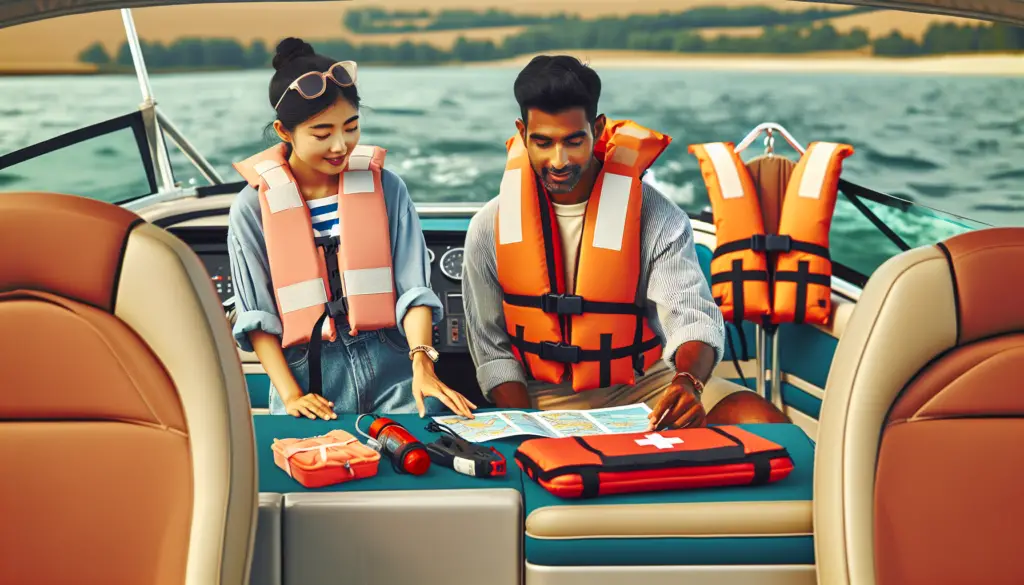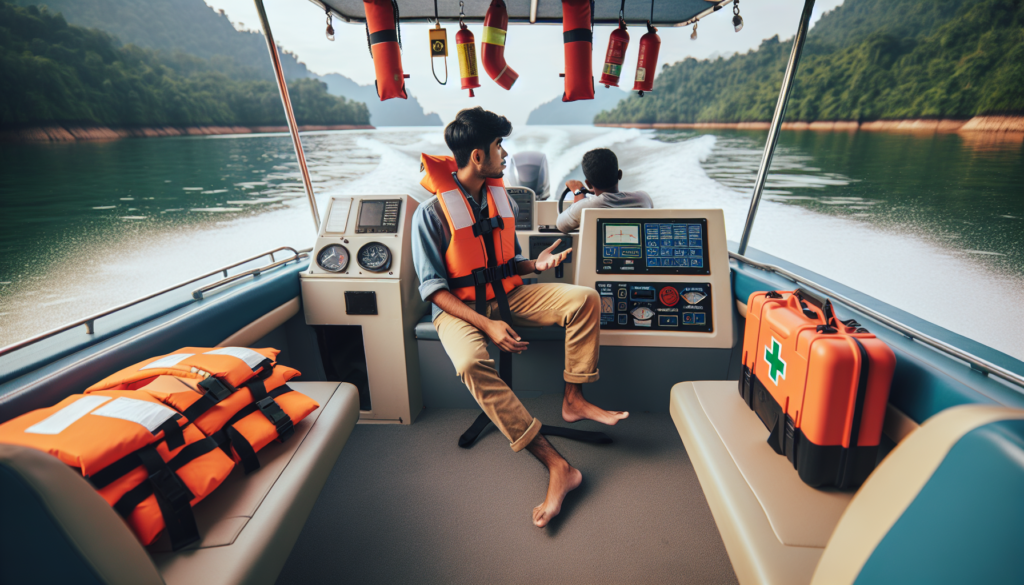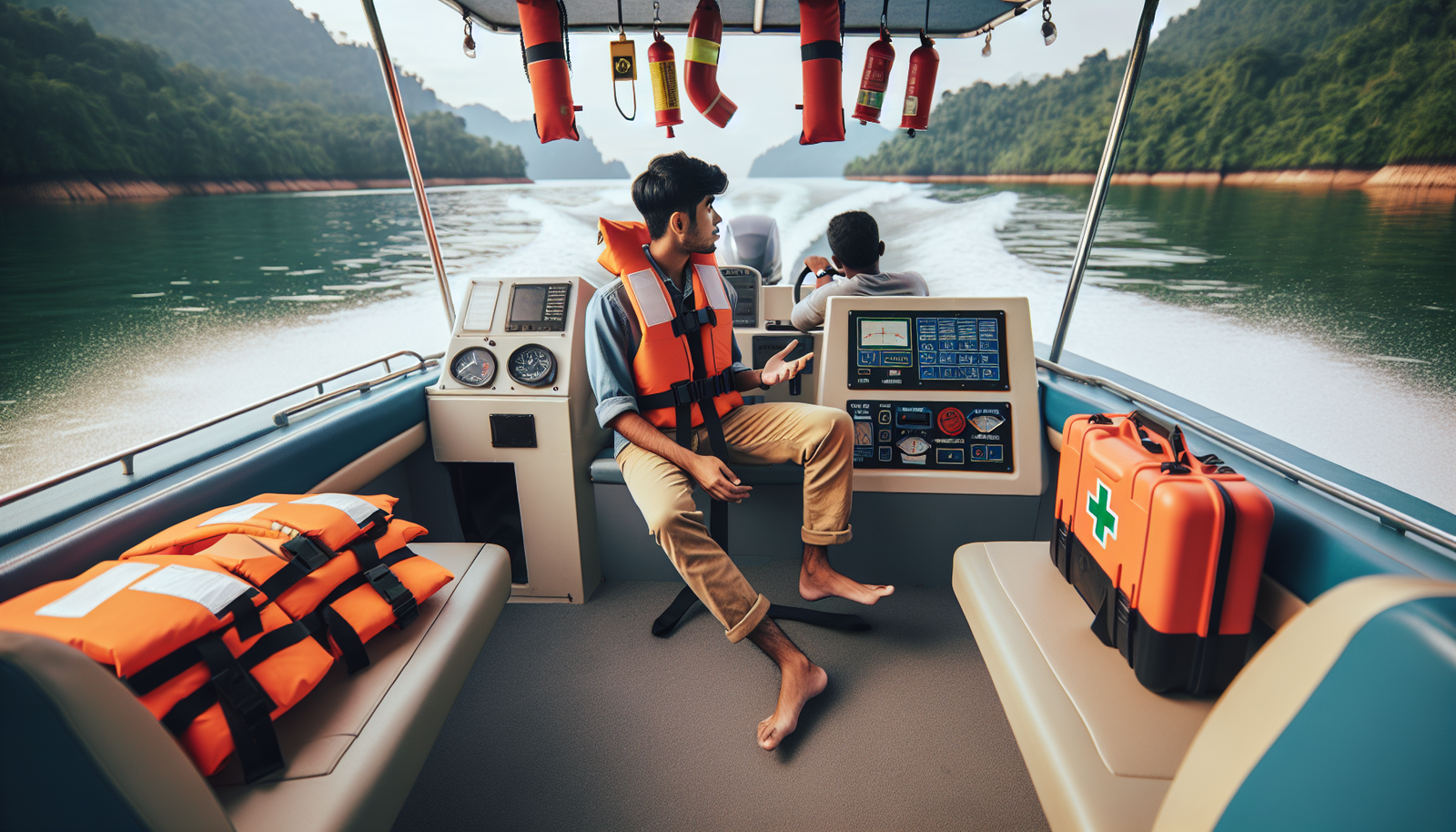Imagine the sun gleaming on your skin as you’re cruising through shimmering seas, a picture perfect day for boating. Now, visualize an instant snap from tranquility to chaos due to a mishap onboard; a scenario that could easily be averted were you equipped with proper safety training. The article, “Why Every Boater Should Take A Safety Course”, paints a vivid picture of the unpredictable water terrains and the importance of a safety course to navigate these instances deftly. It underscores the necessity of such a course for every boater, providing life-saving tools and insights that can potentially morph a disaster into a manageable event.

The Importance of Boater Safety Courses
Have you ever had that overwhelming thrill, the surge of adrenaline when you start the engine of a boat and feel the power beneath you as it cuts through the waves? That’s the allure of boating for many – it offers an exciting escape from everyday routines. But, it’s no secret that this freedom also comes with a hefty accountability. To make sure you and your passengers navigate safe and sound, taking a boater safety course becomes an absolute necessity.
Why Safety Courses are Necessary
You are the captain of your ship – a title that should never be taken lightly. This role assigns you great power and equally great responsibility, which cannot be wielded aptly without mastering the necessary safety rules and measures. Boater safety courses teach you how to confidently handle emergencies, understand the weather, navigation systems, first aid, and much more. Unlike mundane rulebooks, these courses put your knowledge to test through quizzes and simulations. You aren’t merely learning the information; you’re preparing for real scenarios.
The Role of Courses in Promoting Overall Water Safety
Boater safety courses play an essential role in promoting overall safety on the water not only for you but for everyone sharing the waterways. Remember, safe boating practices don’t remain confined to your vessel. They impact the aquatic ecosystem, and your adherence to boating laws can prevent the transport of dangerous goods or disturbances to sensitive environments. Hence, ramping up your knowledge through these courses affects the marinetime safety index on a larger scale.
Understanding the Basics
No captain ran a ship without first learning the ropes. Similarly, to be adept in boating, you must grasp the basics first.
Introduction to Boating Terminology
Knowing the ‘port’ from the ‘starboard’ or the ‘bow’ from the ‘stern’ can initially be quite daunting. But fear not, as boater safety courses will introduce you to boating jargon, making communication with other boaters more efficient and reducing potential confusion in high-stress situations.
Essential Equipment On Board
You don’t want to be caught in choppy waters without a paddle. Safety courses highlight essential equipment you should always carry on board, like ropes, anchors, bilge pumps, navigation lights, and fire extinguishers, among others. Proper knowledge of their functionality and usage is imperative for a smooth sail.
The Proper Use of Life Jackets
Imagine being on an airplane without a seatbelt or driving without a seatbelt. Just as absurd is boating without life jackets. Knowing the correct type of life jacket for water activities, fitting it correctly, and understanding its limitations – these are lifesaving skills you will learn.

Navigational Skills and Knowledge
A boat is a vessel of freedom, but without proper navigation tools and skills, you will be lost at sea – both metaphorically and literally.
Reading and Understanding Nautical Charts
Nautical charts are the blueprint of the sea. Identifying the symbols, reading the depths, and recognizing dangers through a nautical chart is a fundamental skill taught in boating safety courses.
Using Compasses and GPS Systems
In this era of digitization, relying solely on traditional compasses and charts is not enough. You will learn how to take advantage of GPS systems for real-time positioning and how to use them in conjunction with traditional navigation methods.
Understanding Navigational Buoys and Markers
Buoys and markers serve as traffic lights and road signs of waterways. Distinguishing between different types and colors, and understanding their placement can assist you in avoiding shallow waters or dangerous obstructions.
Emergencies on the Water
When you are out in the open water, emergencies can spring up without warning.
Dealing with Equipment Failure
Knowing how to remedy equipment failures, whether it’s a broken bilge pump or an engine that won’t start, can save you from harrowing experiences. You will learn how to assess the problem and apply quick fixes or use alternative measures until professional help arrives.
How to Manage in Poor Weather Conditions
Facing stormy weather on your cozy couch is one thing, but weathering it on a boat is another. These courses teach you how to anticipate a storm’s direction, manage your equipment, and use special techniques to navigate safely.
What to do in case of Man Overboard Situation
Fall overs can result in disorientation, panic and, in worst cases, death. Knowing immediate rescue procedures, using distress signals, and adjusting the navigation can make a dire difference in such circumstances.

Boating Laws and Regulations
Just like on the roads, there are laws and regulations in place over the water to ensure safety and co-existence and to protect the aquatic environment.
Understanding Local and National Boating Laws
Whether it’s the speed limit in a specific area or regulations on disposal overboard, understanding both local and national laws is integral, as negligence can lead to fines or even criminal charges.
Transportation of Dangerous Goods
You might possess certain belongings that, unbeknownst to you, are deemed dangerous aboard a boat. Safety courses will guide you through the legal transportation standards of such goods for minimal risks.
Compliance with Environmental Regulations
The pristine waterways should stay pristine; that’s why boating courses clarify environmental regulations, like waste disposal, strategies to avoid wildlife disturbance, and anti-fouling procedures. You will realize that responsible boating is environmental-friendly boating.
Communication Systems on Board
In high stress situations, your ability to communicate calmly and effectively with the rescue services or other boats can be the difference between swift assistance and prolonged danger.
Understanding VHF Radio Protocol
When you are out on the water, a VHF radio is your direct line to the outside world and rescue services. Recognizing different channels, emergency codes, and standard terminology is crucial. You will also be trained on maintaining etiquette to ensure that the lines remain clear for emergencies.
Using Distress Signals and Flares
In day or night, in sight or out of sight of other vessels – knowing when and how to use distress signals and flares is a paramount rescue skill. You will also learn different emergency codes and the correct usage of EPIRBs (Emergency Position Indicating Radio Beacons).
Communicating with Rescue and Other Boats
Sometimes assistance can come from the least expected quarters – a passing boat or a nearby ship. Your ability to communicate your situation and provide clear instructions can speed up rescue operations or at least offer some moral comfort in times of crisis. Safety courses can teach you how to use a wide range of signaling devices for this purpose – from the classic flags and sound signals to powerful laser-flares.

Handling and Docking Techniques
Each docking situation is unique, highlighting the need for good docking and handling techniques.
Docking and Undocking in Varied Conditions
Battling wind and current while trying to dock or undock your boat can be quite challenging. The safety courses will equip you with various techniques to safely maneuver your boat into and out of the dock.
Anchoring Safely and Efficiently
Anchoring is more than just throwing it overboard. Correctly deciding where to anchor, calculating the depth and tackle to use, and learning how to check your anchor are all vital skills to ensure peace (and safety) of mind.
Handling Techniques for Different Types of Boats
Not all boats are made the same, and not all handle the same. Depending on the type of your vessel (like a bowrider, a pontoon, or a sailboat) handling techniques differ. Safety courses can help you understand these differences and customize your navigation skills accordingly.
First Aid on the Water
Accidents and injuries are unexpected guests overboard. Knowing first aid can provide immediate relief and may help save lives.
Basic First Aid Techniques for Common Boating Injuries
From minor cuts and burns to more severe injuries like head trauma or broken bones, these courses can provide you with the right knowledge and techniques to handle them before professional help arrives.
The Essential First Aid Kit for Boating
An equipped first aid kit is a lifesaver in true sense. You will need to know the constituents of an ideal first aid kit for boating and how to use them effectively.
The Importance of CPR Certification for Boaters
Continuous revival attempts when someone stops breathing can mean the difference between life and death. That is why it is important to have CPR certification, and boating safety courses can facilitate this.
Fueling and Boat Maintenance
Maintaining your boat is key. After all, a well-maintained boat not only gives you a comfortable ride but also keeps you safe on the water.
Correct Procedures for Refueling
Safety courses emphasize this potentially hazardous task and teach you how to conduct it safely and efficiently. A step as simple as turning off all electrical equipment before refueling can prevent a tragedy.
Routine Maintenance and Inspections
You want to catch problems before they manifest. You will learn a regular maintenance and inspection routine to keep your boat in optimal condition.
Troubleshooting Engine and Equipment Problems
Knowing quick-fix solutions to common issues with your boat components can save you from stressful waiting periods for professional help to arrive.
Importance of Weather Knowledge
The weather not only impacts your enjoyment but also significantly influences the safety of your boating journey.
Interpreting Weather Forecasts and Warnings
You wouldn’t want to get caught in a thunderstorm while you’re out boating. Safety courses target this by training you in interpreting weather forecasts and understanding the associated warnings.
Understanding the Impact of Weather on Boat Handling
Weather can dramatically affect your boat handling and therefore your safety. You’ll learn how to handle your boat in various weather conditions – both fair and foul.
The Critical Role of Weather in Boating Safety
The weather lays down the foundation for your entire boating experience – dictating visibility conditions, wind speed, and sea state that directly impact navigation safety. A serving of meteorological knowledge can prove a lifesaver.
In conclusion, a boater safety course is recommended for every boater – from occasional weekend sailors to more experienced seafarers. It is not just a course; it is investing in knowledge for an enhanced boating experience. It shows you that with proper knowledge and adequate preparation, you can weather any situation on the water. So, sail with confidence, sail safely, and enjoy the freedom that boating provides – but do it responsibly.

